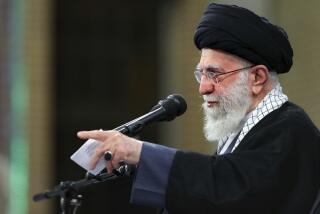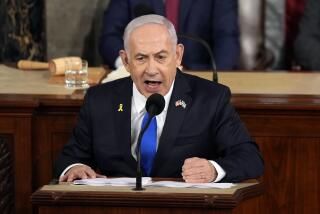AFTERMATH OF THE TOWER REPORT : Israel Motives Clashed With Those of U.S.
In describing Israel’s involvement in the arms-for-Iran deal with the United States, the Tower Commission report states that Israel was driven by motives that often clashed directly with those of Washington.
“Israel had its own interests, some in direct conflict with those of the United States, in having the United States pursue the initiative,” the report states. “For this reason, it had an incentive to keep the initiative alive. It sought to do this by interventions with the NSC (National Security Council) staff, the national security adviser, and the President.”
According to the report, Israel has long been interested in a relationship with Iran and in the promotion of its arms export industry, and saw the arms sales as a means of furthering both objectives.
Concern for Its Soldiers
High on Israel’s agenda as well is concern about its own soldiers either missing or captured in Lebanon and its hope that Iran might help gain their freedom. Four Israeli soldiers are missing in Lebanon from the 1982-83 phase of Israel’s military involvement there, and three more were captured in 1986.
According to sources here, Israel’s interest in the long-running Persian Gulf War between Iran and Iraq is that neither side win. In Israeli eyes, a victory by either Arab Iraq or Persian Iran would constitute a threat. Iraq is a potential enemy on the eastern front, and Iran is the possible promoter of an anti-Zionist, Muslim fundamentalist revolution throughout the Arab world.
The Israeli government had a close relationship with Iran under Shah Mohammed Reza Pahlavi and also sees a common long-term interest with Iran in opposing possible southward expansion into the region by the Soviet Union.
Trying to Do U.S. a Favor
Finally, the sources say, Israel was simply interested in trying to do Washington a favor. Since late 1983, Israel has had a strategic relationship with the United States, the terms of which are still secret, and the Israelis may have sought to prove that they could play a key role in a vital U.S. foreign policy issue.
Although many details of Israel’s role in the Iran arms affair remain murky, the Tower Commission report says Israel may have initiated the first attempt to sell arms to Iran by suggesting the idea to U.S. officials.
The commission concluded that Israeli officials discussed the initiative with the United States before the arms deals began and helped keep it alive at crucial junctures by offering support and specific proposals.
According to the report, former National Security Adviser Robert C. McFarlane said he met on July 3, 1985--before the first arms shipment--with David Kimche, the director general of the Israeli Foreign Ministry, and discussed the possibility of influencing the Iranians to help free American hostages held in Beirut.
Managed First Deliveries
The report says Israel managed the first two arms deliveries to Iran, but the United States took an increasing role in the shipments in following months.
Dan Fisher reported from Jerusalem and Richard C. Paddock from Washington.
More to Read
Sign up for Essential California
The most important California stories and recommendations in your inbox every morning.
You may occasionally receive promotional content from the Los Angeles Times.










